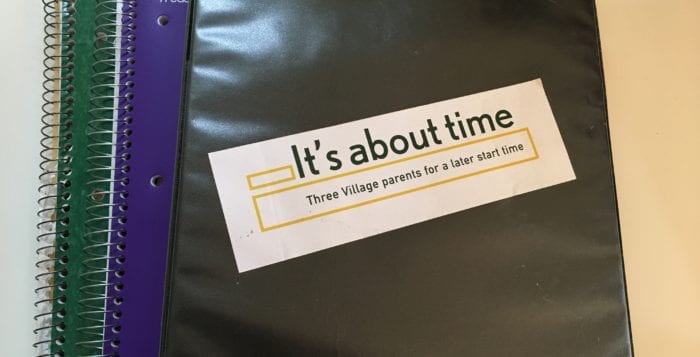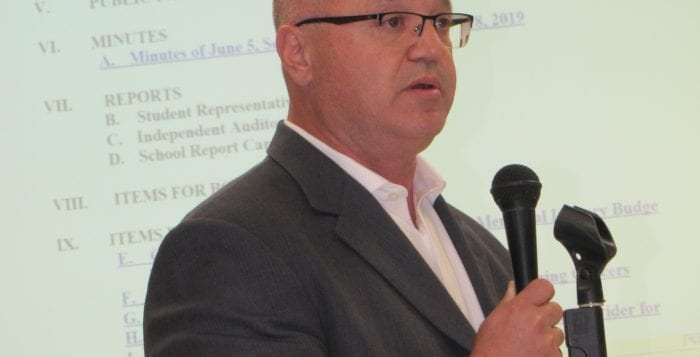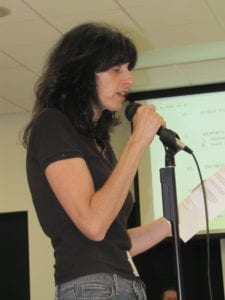After a career that has spanned nearly four decades, Three Village Central School District’s superintendent is ready to retire.
 Cheryl Pedisich has led the district for 10 years, and the position was the culmination of several she has held in Three Village since 1984. Current assistant superintendent for educational services Kevin Scanlon will officially assume the role of superintendent on July 6.
Cheryl Pedisich has led the district for 10 years, and the position was the culmination of several she has held in Three Village since 1984. Current assistant superintendent for educational services Kevin Scanlon will officially assume the role of superintendent on July 6.
Pedisich said she was fortunate to have wise people before her, and the advice she would give Scanlon is from what she learned from them.
“If I’ve learned anything in 38 years, it’s to listen well and to care — to genuinely care — about people and about their issues and about what you do,” she said. “I think that’s the best advice I can give.”
After completing graduate work at C.W. Post — now LIU Post — she applied for positions with different districts and was offered a leave replacement position with Three Village.
“I decided, even though I had other opportunities, that this seemed like a great place to come to, and I did feel that after being here, even if it was just for a year, that it would set my career in motion moving forward and that I would learn a great deal from being part of the community.”
It was the summer of 1984 when she started as a guidance counselor at Ward Melville High School. She said two other counselors with more experience were hired at the same time, and she felt fortunate to be hired.
Her tenure in the district lasted more than the year she would have been grateful for as she continued as a permanent counselor. She went on to chair the guidance department before becoming the assistant director of pupil personnel services and then executive director of pupil personnel. In 2008, she was named assistant superintendent for educational services.
When the search began for a new superintendent in 2011, she was chosen for the position and became deputy superintendent before she took over in July 2012.
Pedisich said that while obtaining her psychology degree in college, she wasn’t considering going into education. Initially, she thought she would seek a career in the field of industrial psychology. Her mother, who worked in the human resources department of Sachem school district, told her she thought she would be a wonderful counselor.
To become a counselor, Pedisich said she would have to enter a two-year program. She figured if she didn’t like the field, she could go back to pursue her other interests.
“It was because of [my mother] that I am probably here today,” she said.
Among the positions she has held in the district, Pedisich said she enjoyed being chair of the guidance department because it enabled her to take on an administrative role while still working with students.
She said she was also fortunate to work as the assistant director of pupil personnel services under executive director Tamara Russo, whom she called “an icon as far as special education.” Pedisich said she learned a lot from Russo. When the executive director retired, Pedisich stepped into the position. She worked with various staff members and said she felt well prepared for the job after working with Russo.
“It was a very inspiring role for me,” she said.
Pedisich, who moved to Long Island from New Jersey in first grade and graduated from Sachem High School, said major adult milestones all happened while she’s worked in the district. In 1989 she married her husband Luke, and she had their two children, Hope and Christopher. While the couple brought up their son and daughter in Miller Place, where they still live today, she said from 8th grade until Hope’s graduation in 2009, she and her husband paid tuition for her daughter to attend school in the Three Village district because Hope wanted to attend classes there.
“I couldn’t say enough positive things about Three Village,” Pedisich said. “I’m so glad she had that experience.”
Pedisich has loved being part of the local school community.
“It feels like family to me, so leaving is so incredibly bittersweet,” she said. “I’m not walking away saying, ‘Oh, I can’t wait to put it all behind me.’ It’s really a struggle.”
The superintendent said it’s difficult to pinpoint favorite memories from the decades.
“All my interactions with the students have been so inspiring and so amazing,” she said.
The interactions with students and parents and providing some degree of support or making a difference was rewarding, she added.
She also has encountered difficult times during her career.
Among the hardest through the years, she said, were when students and staff members passed away, leaving many who mourned. The superintendent said it was important to help everyone in the school community “grieve in a way that was meaningful for them, and to help the recovery process.”
The COVID-19 pandemic was also tricky waters to navigate.
“We have been through hurricanes, and we have been through tornadoes and even an earthquake during my tenure,” she said. “I’m thinking, ‘OK, what’s next?’ And then, it’s a pandemic. I think that was extraordinarily difficult because we were all feeling very blinded by it and trying to navigate all of those nuances and the ever-changing requirements and the new variants coming up. We had to keep shifting and pivoting.”
She added the administration realized there were different viewpoints in the community, and they needed to balance the varying opinions.
“The pandemic brought hopelessness to the surface for many,” she said.
As she looks toward the future, Pedisich said she’s not sure what it will hold, but she will take some time to decompress before figuring out her next move.
She leaves the Three Village district community with a message.
“Stay the course,” Pedisich said. “Be strong. Be resolute and believe in yourself. Never give up on whatever dreams you have.”














